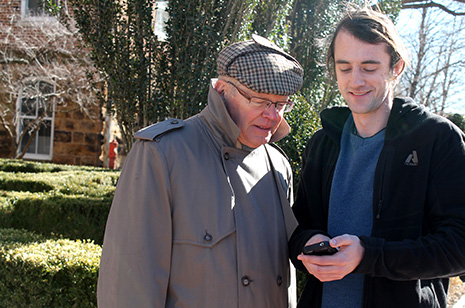Mobile Game Teaches Hard Science

Phil Crandall and Robbie Engler view a video on Michaelis-Menten kinetics in the courtyard behind Old Main.
FAYETTEVILLE, Ark. – Honors chemistry and kinesiology senior Robbie Engler has taken a topic that even professors describe as sleep-inducing and turned it into a mobile game that will send students racing across campus on an educational treasure hunt.
The object of the game? Learn how to turn corn into high fructose corn syrup – and in the process, master the difficult details of enzyme kinetics, which measures the rate at which certain chemical reactions occur and studies the effect of varying conditions of the reaction. “Enzyme kinetics is a topic students struggle with – at some point it comes down to words and a lot of numbers on a board,” Engler said. “But the way you deliver that information can change. This game allows for breaks, pauses and physical activity.”
The game leads players through every step of the process that turns corn into a sugary sweetener: from collecting a “corn token” at a virtual cornfield to final instructions for purifying and blending the mixture to make high fructose corn syrup. Concepts like Michaelis-Menten kinetics, an equation that describes the rate of enzymatic reactions, are encountered and described in short videos that are logged in an active quest, rather than highlighted in a heavy textbook. The entire exercise is framed as preparation for a job interview, an appealing premise for many university students.
Engler developed the game in a new honors section of a food chemistry course. The honors section was created with seed funding from the Honors College, which has provided more than $500,000 in startup funds for 30 interdisciplinary courses to date. Phil Crandall, professor of food science; Ed Clausen, professor of chemical engineering; and Dennis Beck, assistant professor of educational technology, developed the idea of an honors section where students could develop and share game-based learning modules that supplement the traditional textbook, lecture and lab format.
Mobile games have been tapped for campus tours and some history topics, but using the technology to teach tough science concepts is new.
“In terms of the topic area, in the hard sciences, this game is almost unprecedented,” said Dennis Beck. “Many of our students would much rather learn content in this engaging way, rather than reading a textbook or listening to a lecture.”
Engler’s game also will allow the university to leverage a costly investment – a wet lab where the handling of chemicals, drugs and other materials in liquid solutions or volatile phases require direct ventilation and specialized piped utilities.
“Students in chemistry, chemical engineering and food science all have to learn enzyme kinetics, and the wet lab where they learn this costs $800 to $1,200 per square foot,” said Crandall. “It’s the most expensive lab, per square foot, on campus. This app gives us the opportunity to cover topics outside of the lab, so that more than one class can use that costly wet lab space in any given semester. And it’s getting the students totally engaged in the material, which is very difficult.”
Crandall plans to share the game with several other food chemistry professors, who will test it with their students.
“We’ll get feedback, make changes as needed, then shop it nationwide,” he said. Eventually, Crandall and Engler will coauthor an article on the game that they hope to publish in the Journal of Food Science Education.
Engler plans to embrace both of his majors by teaching chemistry and physical education in high school and likely will develop more tools that support self-paced, individualized learning.
“There’s no sense in ignoring technology in the classroom,” Engler said. “Let’s embrace it.”
The FDSC-H game is part of the ARIS educational app, available through iTunes. ARIS may be accessed using an iOS device (a mobile operating system developed and distributed by Apple Inc., such as an iPhone, iPod Touch, or iPad); it is not available for other smart phones.
Topics
Contacts
Phil Crandall, professor, Department of Food Sciences
Dale Bumpers College of Agricultural, Food & Life
479-575-7686,
crandal@uark.edu
Kendall Curlee, director of communications
Honors College
479-575-2024,
kcurlee@uark.edu
Headlines
PetSmart CEO J.K. Symancyk to Speak at Walton College Commencement
J.K. Symancyk is an alumnus of the Sam M. Walton College of Business and serves on the Dean’s Executive Advisory Board.
Faulkner Center, Arkansas PBS Partner to Screen Documentary 'Gospel'
The Faulkner Performing Arts Center will host a screening of Gospel, a documentary exploring the origin of Black spirituality through sermon and song, in partnership with Arkansas PBS at 7:30 p.m. Thursday, May 2.
UAPD Officers Mills and Edwards Honored With New Roles
Veterans of the U of A Police Department, Matt Mills has been promoted to assistant chief, and Crandall Edwards has been promoted to administrative captain.
Community Design Center's Greenway Urbanism Project Wins LIV Hospitality Design Award
"Greenway Urbanism" is one of six urban strategies proposed under the Framework Plan for Cherokee Village, a project that received funding through an Our Town grant from the National Endowment for the Arts.
Spring Bike Drive Refurbishes Old Bikes for New Students
All donated bikes will be given to Pedal It Forward, a local nonprofit that will refurbish your bike and return it to the U of A campus to be gifted to a student in need. Hundreds of students have already benefited.




